The Best Morning and Bedtime Routines For Healthy Sleep

Getting quality sleep is essential for our well-being, and it takes more than just the right pillows and mattresses. Establishing consistent morning and bedtime routines is key to healthy sleep. Together, we'll explore the best practices for healthy sleep habits so you can start to experience restful and rejuvenating sleep night after night.

Rise and Shine!
New day, same wakeup time
Our bodies crave routine, and waking up at the same time every day helps regulate our internal clock, which is responsible for our sleep cycle. To avoid disrupting your body's circadian rhythm, wake up at the same time every day, even on weekends.
Soak up the sun
Exposure to natural sunlight helps set our circadian rhythm, known as our body's internal clock, and signals to our brain that it's time to be awake. As soon as you wake up, try opening your curtains or blinds to let in natural light.
Hydrate, hydrate, hydrate
After a long night's sleep, our bodies require hydration. Drinking a glass of water first thing in the morning can help jump-start your metabolism, hydrate your body, and improve brain function.
Move your body
Morning exercise or stretching can help improve mood, increase energy levels, and boost cognitive function. Getting your blood flowing with a simple yoga routine or walking around the block can get your day started on the right foot.
The most important meal of the day
Eating a fulfilling breakfast can help jump-start your metabolism, balance blood sugar levels, and provide your body with the energy it needs to tackle the day's activities. Opt for whole grains, protein, and healthy fats to keep you full and energized throughout the morning.

Winding Down
Establish a regular bedtime
Just as waking up at the same time every day is important, establishing a regular bedtime can help regulate your body's internal clock and promote healthy sleep habits. Go to bed at the same time every night, even on weekends, to help train your body to fall asleep more easily.
Say goodnight to blue light
Blue light emitted by electronic devices, like TVs and phones, can interfere with our body's natural production of melatonin, an essential hormone for sleep regulation. Avoid using electronic devices for at least an hour before bedtime to help your body transition into a state of relaxation.
Wash the day off
A warm bath or shower can help relax the body and reduce muscle tension, making it easier to fall asleep. The warm water can also help increase blood flow and promote relaxation.
Create a sleep-friendly sanctuary
Healthy sleep cycles start with a sleep-friendly environment to promote relaxation and improve sleep quality. Keep your bedroom cool, dark, and quiet, and invest in comfortable bedding and pillows that support your sleeping position.
Put your mind at ease
Relaxation techniques such as deep breathing or meditation can help calm the mind and promote relaxation, making it easier to fall asleep. Incorporate these techniques into your nighttime routine to help promote rejuvenating sleep and intentional rest.
Additional Tips
While morning and bedtime routines are essential for good sleep habits, there are also a few tips that can help maintain good sleep habits throughout the day. These include:
- Avoiding caffeine and heavy meals in the afternoon: Heavy meals or caffeine can interfere with the body's metabolic flow and keep you awake at night. At least four hours before bedtime, caffeine and heavy meals should be avoided.
- Take a work break: Breaks throughout the day can reduce stress and fatigue, allowing the body to recharge and sustain energy levels. In this way, you can avoid napping or oversleeping, which can disrupt your sleep-wake cycle.

Consistency is Key
Maintaining a consistent sleep schedule—going to bed and waking up at the same time every day, including weekends—is essential for regulating your body’s internal clock. Disruptions can cause sleep deprivation and other health issues.
Equally important is a regular bedtime routine that signals your body to wind down. By sticking to consistent sleep habits and good sleep hygiene, you can improve sleep quality and overall well-being.
Consistency Checklist for Better Sleep
- Wake up at the same time every day, including weekends
- Go to bed at the same time every night
- Avoid sleeping in or napping excessively on off days
- Create a calming pre-sleep routine (e.g., reading, gentle stretching, meditation)
- Limit screen time at least 30 minutes before bed
- Keep your bedroom environment comfortable and quiet
- Avoid caffeine and heavy meals close to bedtime
- Use the same sleep environment consistently (bed, pillows, blankets)
- Track your sleep schedule to identify patterns and make adjustments if needed
By following this checklist, you can reinforce your body's internal clock and enjoy the benefits of restorative, consistent sleep.

Relaxation Techniques
Relaxation techniques like deep breathing, meditation, and yoga can greatly reduce stress and promote better sleep. These practices activate your body’s natural relaxation response and are accessible and affordable—no expensive products required!
- Deep breathing: Slow, deep breaths calm your heart rate and ease tension.
- Meditation: Focusing your mind helps quiet stress and promote relaxation.
- Yoga: Combines movement, breathing, and mindfulness for overall relaxation.
Try one or mix a few to find a routine that works best for you!
Conclusion
Establishing consistent morning and bedtime routines can lead to better sleep habits and improved health. These tips can help individuals start their day feeling refreshed and energized and end it with a restful sleep. Even incorporate relaxation techniques into your routine to promote relaxation and reduce stress and anxiety. Are you ready to transform your sleep quality and overall health? This blog is your perfect starting guide!